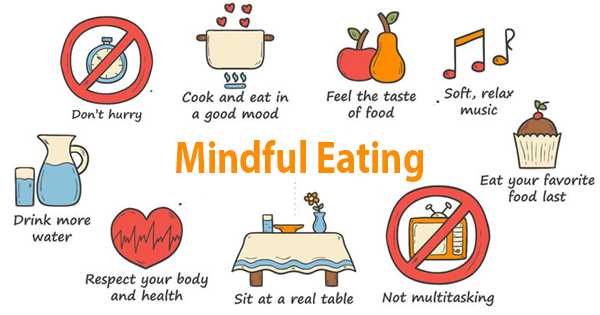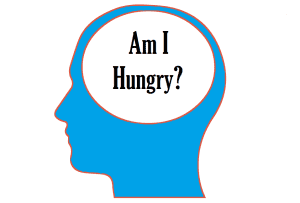Welcome to our Monthly Challenges
Did you know you subconsciously work harder when there’s an end date to your goals?
The shorter time frame keeps you actively putting effort in, particularly when it’s the end of the month.
Your Goal in March is: Mindful Eating
The Challenge
This challenge is a little different, and is mainly about bringing more awareness to the food you eat.
A nice little summary from ZenHabits.net can be found here, which covers some of the basic principles.
Too many of us eat while doing other activities, be it watching TV, working at our desks or driving a car.
Several studies [1,2] have shown that “Distracted Eating” leads us to consume ~10% more calories during that meal, and up to 25% more throughout the day. To put that in perspective, on a 2000 calorie diet you’d eat an extra 500 calories a day, which would lead to weight gain of around 1lb a week in body fat.
They noted that “a) being distracted or not paying attention to a meal caused more to be eaten and b) by paying attention participants were likely to eat less food through the day.”
If you snack while driving, eat lunch at your desk or have dinner in front of the TV, then this challenge is particularly important for you.

Health Benefits
By bringing more awareness to the food we eat, we may notice bad habits like over-eating or eating without really being hungry.
As the studies above show, simply paying attention to the food and not to the television during meals can reduce our calorie consumption by a significant amount.
You will hopefully learn to eat only when you’re hungry, and stop when you’re full and not when the plate is empty.
You may notice that beyond the exciting wrapper, junk food is not actually that satisfying and doesn’t make you feel too great the rest of the day.

Tips
- Start with one meal a day. (Hint: the one you normally eat while most distracted).
- Eat slower. Put your cutlery down between each mouthful, and don’t pick it up until you’ve swallowed. The meal is not a race.
- Chew your food longer. When you would normally swallow, have an extra 15-20 chews of the food. This will also aid digestion.
- Think about how the food was made. Was it grown from plants? If it’s meat, was the animal healthy? Does it have dozens of preservatives and chemicals included? Was it likely made on a factory production line?
- Notice how full you are before, during and after eating.
- Eat when you are hungry. Hunger and thirst are very similar feelings. If in doubt, have a glass of water first, then see if you are still hungry.
- Check out information like the Physical v Emotional Eating Checklist (above) at EatingMindfully.com
Thanks for reading this article. Please share it with whomever shares your meal times; friends, family or co-workers. It’s much easier to complete a goal if someone else is doing it along with you!
It’s also worth checking our Mindless Eating by Brian Wansink, which discusses this topic in more detail. Check out his book review here.

